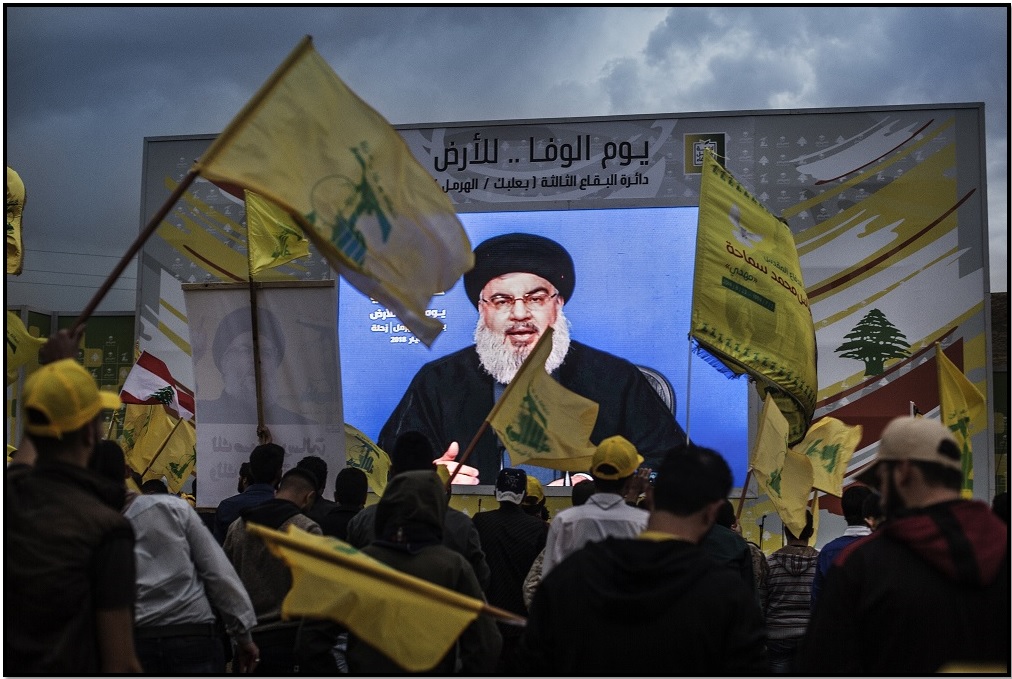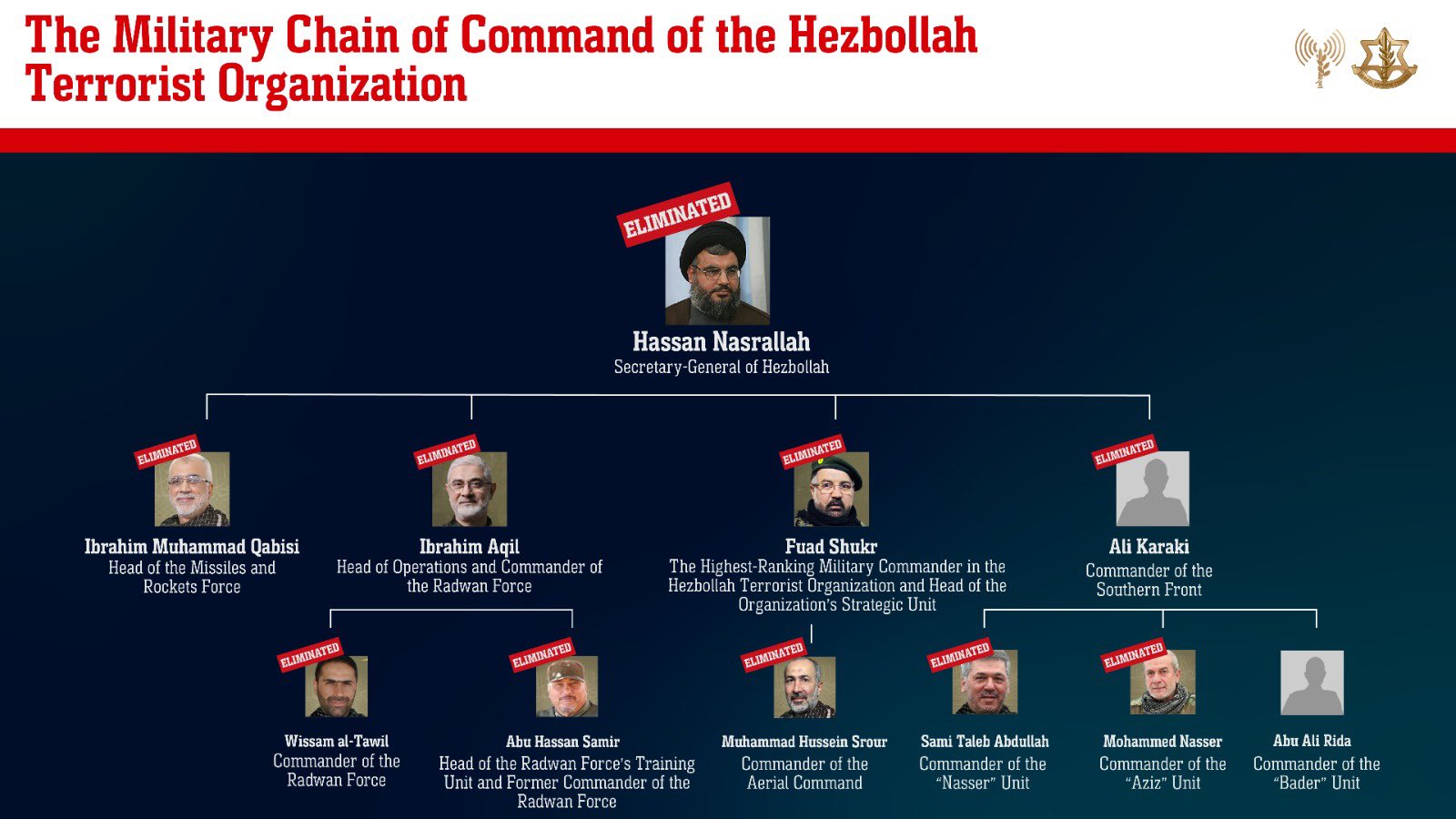Hezbollah leader Hassan Nasrallah, the leader of Iran’s most important ally in the Middle East, was killed in an Israeli airstrike on Sept. 27, 2024. Israel’s ability to cripple Hezbollah in a matter of weeks called Iran’s longstanding “forward defense” doctrine into question. For decades, the Islamic Republic has relied on its militia allies across the region to pressure Israel and deter strikes on Iranian soil. Hezbollah – sitting on Israel’s northern border with an arsenal of rockets, missiles and drones – was the centerpiece of the strategy.
Israeli jets dropped more than 80 heavy bombs, which destroyed six residential buildings and the bunker below in Beirut's Dahiyeh suburb. “The strike was carried out while the top brass of Hezbollah were at their headquarters and engaged in coordinating terror activities against the citizens of the State of Israel,” the Israel Defense Forces (IDF) said in a statement.
Nasrallah, a charismatic cleric known for fiery speeches, had led the Shiite militia and political movement since 1992. He succeeded Abbas al Musawi, who was assassinated by Israel that year. Under Nasrallah and with major support from Iran and Syria, Hezbollah evolved from an underground militia to become one of the region’s most formidable forces. It also became a kingmaker in Lebanese politics by holding seats in parliament and cabinet posts. Hezbollah fought a war with Israel in 2006, which lasted 34 days and ended in a military stalemate. After the Syrian uprising turned violent in 2011, Hezbollah intervened to bolster the Assad regime, another ally of Iran.

For nearly two decades, Nasrallah had been widely thought to be virtually untouchable. Rarely seen in public since the 2006 war with Israel, he spent much of his time in a network of underground bunkers. The death of Nasrallah and other commanders was one of several Israeli blows to the group in the second half of September:
- September 17: Israel allegedly triggered explosions on thousands of pagers used by Hezbollah fighters and followers. Devices detonated in Beirut, the eastern Bekaa Valley and southern Lebanon as well as in neighboring Syria. At least 12 people died and nearly 3,000 were injured.
- September 18: Israel allegedly triggered explosions on hundreds of walkie-talkies used by Hezbollah fighters and followers. The attack targeted Hezbollah in at least three strongholds—Beirut, the eastern Bekaa Valley and southern Lebanon. At least 25 people were killed and more than 600 were injured.
- September 20: Israel killed Ibrahim Aqil, the commander of Hezbollah’s elite Radwan unit and a member of the Jihad Council, and about 15 other commanders in an airstrike on a building in Beirut.
- September 23: Israel launched airstrikes on more than 300 Hezbollah targets in southern Lebanon and the eastern Bekaa valley, killing nearly 500 people.
- September 25: Israel killed Ibrahim Kobeissi, the chief of Hezbollah’s missile unit, in an airstrike on southern Beirut.
- September 26: Israel killed Mohammad Surour, the head of Hezbollah’s drone unit, in an airstrike on Beirut.
- September 27: Israel killed Hezbollah leader Hassan Nasrallah as well as Ali Karaki, the commander of the group’s southern front, and other senior commanders in a strike on the group’s underground headquarters in southern Beirut. Abbas Nilforoushan, the deputy commander of operations of Iran's Revolutionary Guards, was also killed.
- September 28: Israel killed Nabil Kaouk, the deputy head of Hezbollah’s Central Council, in an airstrike.

Hezbollah, in solidarity with the Palestinians, started attacking Israel one day after the Hamas-led assault on Israel on Oct. 7, 2023. Israel’s campaign against the Lebanese militia was initially conducted on fighters deployed south of the Litani River. But it gradually expanded attacks to other parts of Lebanon. It started assassinating senior commanders in mid-2024. By late September, Israel had reportedly killed more than 500 Hezbollah fighters, including dozens of commanders. The following are Israeli statements on the death of Nasrallah.
Prime Minister Benjamin Netanyahu
Sept. 28, 2024: “’If someone rises up to kill you, kill him first.'
“Yesterday, the State of Israel eliminated the arch-murderer Hassan Nasrallah. We have settled accounts with someone who was responsible for the murders of countless Israelis and many nationals of other countries, including hundreds of Americans and dozens of French.
“Nasrallah was not just another terrorist, he was the terrorist. He was the axis of the axis, the main engine of Iran's axis of evil. He and his people were the architects of the plan to destroy Israel. He was not only operated by Iran, he also frequently operated Iran.
“Therefore, at the beginning of the week, I came to the conclusion that the powerful blows that the IDF has been landing on Hezbollah in recent days were not enough.
“The elimination of Nasrallah is a necessary condition in achieving the objectives we have set: Returning the residents of the north safely to their homes, and changing the balance of power in the region for years.
“As long as Nasrallah was alive, he would have quickly rebuilt the capabilities we took from Hezbollah. Therefore, I gave the directive – and Nasrallah is no longer with us. His elimination advances the return of our residents to their homes in the north. It also advances the return of our hostages in the south. The more that Sinwar sees that Nasrallah will not be coming to his rescue, the greater are the chances for returning our hostages.
“I would like to thank the IDF, the Air Force, IDF Intelligence, the Mossad and the ISA for the great achievements, and not just yesterday.
“Citizens of Israel,
“We have great achievements but the work has still not been completed. In the coming days, we will face significant challenges and we will face them together.
“Nasrallah spoke about us as 'spider webs.' But instead of 'spider webs', he found the tendons of steel of a united and mighty nation that is determined to ensure its existence and its future. Not only has Hezbollah discovered this. The entire Middle East has discovered this.
“All those who oppose the axis of evil, all those who are fighting under the violent dictatorship of Iran and its proxies in Lebanon, Syria, Iran itself and other places, they are all filled with hope today. I say to the citizens of those countries: Israel stands with you. And to the ayatollahs' regime I say: Those who strike us, we strike them.
“There is no place in Iran or the Middle East that the long arm of Israel cannot reach. Today, you already know that this is correct.”
IDF Chief of the General Staff Lt. Gen. Herzi Halevi
Sept. 28, 2024: "Nasrallah indiscriminately murdered Israeli civilians and aimed to end this war with the destruction of the State of Israel. We made sure that did not occur. We eliminated him, and we will continue to grow stronger. Hezbollah has murdered innocent people worldwide, hiding his weapons under the homes of families, women and children and turning them into human shields. As we have shown, we will not allow such a threat to our citizens. We are determined to continue destroying the Hezbollah terrorist organization and to keep fighting."
